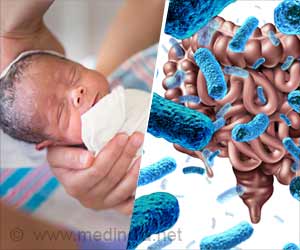
However, experts say that in most cases the antibiotics are prescribed unnecessarily as only a small proportion of those who receive the drugs are eventually diagnosed with an infection.
Researchers from the Universities of Edinburgh and Birmingham, and the Spaarne Hospital and University Medical Centre Utrecht, The Netherlands, conducted a clinical trial involving 227 babies to analyze how antibiotics affect a newborn’s microbiome.
Some 147 infants with suspected sepsis received one of three standard antibiotic treatments. Their outcomes were compared with those of 80 babies with no suspected infections and those who have not been prescribed an antibiotic.
All babies had a rectal or fecal sample taken before and after treatment, and at one, four, and 12 months of age. The samples were analyzed for the microbes that made up their newly forming microbiome and for bacterial genes related to antimicrobial resistance.
For newborns who had been prescribed antibiotics, there was found to be a significant decrease in the levels of different Bifidobacterium species compared with babies who had no antibiotic treatment.
These microbes aid in the digestion of human breast milk and promotes gut health, while also supporting the immune defense against infection.
They also found an increase in potentially disease-causing bacteria and in the number and abundance of genes related to antimicrobial resistance in the group that received antibiotics.
Though gradually recovering over time, the changes to the microbiome and antimicrobial resistance genes persisted for at least 12 months and did not improve with breastfeeding, which is known to help a baby’s immune system.
READ RELATED: ASK CAROLINE: My partner is jealous of my male friend
Professor Debby Bogaert at the University of Edinburgh and study lead, said: “We were surprised with the magnitude and duration of the effects of broad-spectrum antibiotics on the infants’ microbiome when compared to effects of those same antibiotics on adults’ microbiota. This is likely because the antibiotic treatment is given at a time that infants have just received their first microbes from their mother and have not yet developed a resilient microbiome”.
Of the three antibiotic treatment regimens tested, the combination of penicillin and gentamicin, was found to have the least detrimental effect on a baby’s gut microbiome and the number of antimicrobial resistance genes that emerge.
Researchers conclude this particular combination of antibiotics should be preferably prescribed when treating suspected infections in newborns.
This study underlines the importance of further studies into balancing the need and effectiveness of these antibiotics and the risk of the emergence of genes linked with resistance.
There may also be scope to develop new interventions, like live biotherapeutics – a treatment that is produced by or involving living cells to effectively restore the composition of the infant gut microbiome after antibiotic therapy.
Source: Medindia
Source:








